- Home
- Amish Tripathi
The Secret of the Nagas Page 5
The Secret of the Nagas Read online
Page 5
‘You can’t get more obvious than that, my friend! You’re right, it has nothing to do with men and women. It has to do with the way of life of the Suryavanshis and Chandravanshis.’
‘Way of life?’
‘Prince Ugrasen has been killed?’ asked Bhagirath.
‘Yes, Your Highness,’ said Siamantak softly. ‘The news is from a source I trust implicitly.’
‘Lord Ram help us! This is all we need. King Mahendra will think Ayodhya arranged the assassination. And you know how vengeful he can get.’
‘I hope that he doesn’t think that, Your Highness,’ said Siamantak, ‘It’s the last thing we need.’
‘Their spies have been following us,’ said Nandi. ‘I’m sure they have a report of our whereabouts and movements since we have entered the city. We cannot be blamed.’
‘No, Nandi,’ said Bhagirath. ‘King Mahendra can also think that we hired assassins to do his son in. By the way, where are the spies?’
‘Two of them,’ said Drapaku, pointing with his eyes in the direction of the spies. ‘They are quite amateurish. That tree doesn’t really hide them!’
Bhagirath smiled slightly.
‘It could be Surapadman,’ said Siamantak. ‘Everyone in Swadweep is aware that the younger Magadh Prince is ruthless. He could have arranged the killing to claim the throne.’
‘No,’ said Bhagirath, narrowing his eyes. ‘Surapadman is by far the more capable son of King Mahendra. For all his faults, the king of Magadh does respect capability, unlike some other rulers I know. Surapadman practically has the throne. He doesn’t need to kill his brother for it.’
‘But how come there is no public mourning as yet?’ asked Drapaku.
‘They’re keeping the news secret,’ said Siamantak. ‘I don’t know why.’
‘Maybe to arrange a credible story to give at least some respectability to Ugrasen’s memory,’ said Bhagirath. ‘That idiot was quite capable of stumbling upon his own sword!’
Siamantak nodded before turning towards Drapaku. ‘Why does the Lord want to spend so much time in the temple alone? It’s quite unorthodox.’
‘That’s because the Lord himself is quite unorthodox. But why are we keeping his identity secret in Magadh?’
‘Not everyone who believes in the legend is a follower of the Neelkanth, Drapaku,’ said Bhagirath. ‘The present king of Magadh does not follow the Neelkanth. And the people here are loyal followers of the King. The Lord’s identity is best kept undisclosed here.’
‘You know what makes humans special when compared to animals?’ asked the Pandit.
‘What?’ asked Shiva.
‘The fact that we work together. We collaborate to achieve combined goals. We pass on knowledge to each other, so every generation begins its journey from the shoulders of the previous generation and not from scratch.’
‘I agree. But we are not the only ones who work in a pack. Other animals, like the elephants or lions, do it as well. But nobody does it on the scale that we do.’
‘Yes, that’s true. But it’s not always about collaboration. It is sometimes about competition as well. It’s not always about peace. Many times, it’s also about war.’
Shiva smiled and nodded.
‘So the key point is that we humans are nothing individually,’ said the Pandit. ‘Our power flows from all of us. From the way all of us live together.’
‘Yes,’ agreed Shiva.
‘And if we have to live together, we must have a way of life, right?’
‘Yes. Some method for all of us to collaborate or compete with each other.’
‘Most people believe there are many hundred ways of life in the world,’ said the Pandit. ‘Every civilisation thinks that it is unique in some way.’
Shiva nodded in agreement.
‘But if you actually distil the way people live, there are only two ways: The Masculine and the Feminine.’
‘And what do these ways of life mean?’
‘The masculine way of life is “life by laws”. Laws that could be made by a great leader, perhaps a Vishnu like Lord Ram. Or laws that come down from a religious tradition. Or collective laws decreed by the people themselves. But the masculine way is very clear. Laws are unchangeable and they must be followed rigidly. There is no room for ambiguity. Life is predictable because the populace will always do what has been ordained. Meluha is a perfect example of such a way of life. It is obvious, therefore, why the people of this way of life live by the code of Truth, Duty and Honour. Since that’s what they need to be successful in this system.’
‘And the feminine?’
‘The feminine way of life is “life by probabilities”. There are no absolutes. No black or white. People don’t act as per some preordained law, but based on probabilities of different outcomes perceived at that point of time. For example, they will follow a king who they think has a higher probability of remaining in power. The moment the probabilities change, their loyalties do as well. If there are laws in such a society, they are malleable. The same laws can be interpreted differently at different points of time. Change is the only constant. Feminine civilisations, like Swadweep, are comfortable with contradictions. And the code for success in such a system? Unmistakeably, Passion, Beauty and Freedom.’
‘And no one way of life is better?’
‘Obviously. Both types of civilisations must exist. Because they balance each other.’
‘How?’
‘You see, a masculine civilisation at its peak is honourable, consistent, reliable and spectacularly successful in an age suitable for its particular set of laws. There is order and society moves coherently in a preordained direction. Look at the Suryavanshis today. But when masculine civilisations decline, they cause horrible turmoil, becoming fanatical and rigid. They will attack those that are different, try to “convert” them to their “truth”, which will lead to violence and chaos. This especially happens when an age changes. Change is difficult for the masculine. They will cling even more rigidly to their laws, even though those laws may be unsuitable for the new age. Masculine civilisations enforce order which is welcome when they are strong, but is suffocating when they decline. The Asuras, who were followers of the masculine way, had faced similar problems when their power started waning.’
‘So when fanaticism causes rebellions born of frustration, the openness of the feminine brings a breath of fresh air.’
‘Exactly. The feminine way incorporates all differences. People of varying faiths and belief can coexist in peace. Nobody tries to enforce their own version of the truth. There is a celebration of diversity and freedom, which brings forth renewed creativity and vigour causing tremendous benefits to society. The Devas, who were followers of the feminine way, brought in all this when they defeated the Asuras. But as it happens with too much freedom, the feminine civilisations overreach into decadence, corruption and debauchery.’
‘Then the people once again welcome the order of the masculine.’
‘Yes. The feminine Deva way was in decline during Lord Ram’s times. The country was corrupt, immoral and depraved. People clamoured for order and civility. Lord Ram ushered that in as he created a new masculine way of life. Very intelligently, to prevent unnecessary rebellions, he never decried the Deva way. He just called his rule a new way of life: the Suryavanshi path.’
‘But can you really say the masculine and the feminine only exist at the level of civilisations?’ asked Shiva. ‘Doesn’t it really exist within every man and woman? Doesn’t everyone have a little bit of the Suryavanshi and a bit of the Chandravanshi within themselves? Their relative influence within the individual changing, depending upon the situations he faces?’
‘Yes, you are right. But most people have a dominant trait. Either the masculine or the feminine.’
Shiva nodded.
‘The reason why you need to know the two ways of life is because once you have discovered evil, you would have to tailor your message depending on which people you speak to. You wi
ll have to convince the Suryavanshis in one manner and the Chandravanshis in an altogether different manner in the battle against evil.’
‘Why would I need to convince them? I don’t think either the Suryavanshis or Chandravanshis lack in courage.’
‘It has nothing to do with courage, my friend. Courage is only needed once the war begins. To begin with you need to persuade the people to embark upon the war against evil. You will need to influence them to give up their attachment to evil.’
‘Attachment! To evil!’ cried a flabbergasted Shiva. ‘Why in the name of the holy lake would anyone be attached to evil?’
The Pandit smiled.
Shiva sighed. ‘Now what? What’s the explanation for stopping the conversation at this moment? I’m not ready? The time is not right?’
The Pandit laughed. ‘I can’t explain it to you right now, O Neelkanth. You would not understand. And when you discover evil, you would not need my explanation in order to understand. Jai Guru Vishwamitra. Jai Guru Vashisht.’
Chapter 4
The City Where the Supreme
Light Shines
‘Prince Surapadman?’ asked a surprised Bhagirath. ‘Here!’
‘Yes, Your Highness,’ said Siamantak, worried.
Bhagirath turned towards Shiva. The Neelkanth nodded.
The prince of Ayodhya turned towards Siamantak. ‘Let Prince Surapadman in.’
Moments later a dashing figure marched in. Tall, well-built and swarthy, Surapadman sported a handle bar moustache smoothly oiled and curled up at the edges. His well-maintained hair was long and neatly arranged under an extravagant yet tasteful crown. He wore an ochre dhoti with a white angvastram, sober for a Chandravanshi royal. There were numerous battle scars on his body, a sign of pride on any Kshatriya.
He walked straight up to Shiva, went down on his haunches and touched the Neelkanth’s feet with his head. ‘My Lord, it is an honour to finally have your presence in India.’
A surprised Shiva had the presence of mind not to step back. That could easily have been seen as an insult. He blessed Surapadman with a long life. ‘Ayushman Bhav, Prince. How did you know who I am?’
‘Divine light cannot be kept secret, My Lord,’ said Surapadman, turning towards Bhagirath with a knowing smile. ‘No matter how strong a veil one puts on it.’
Bhagirath smiled and nodded at Surapadman.
‘I heard about your brother,’ said Shiva. ‘Please accept my condolences.’
Surapadman didn’t say anything to acknowledge the commiseration. He bowed politely and changed the subject. ‘I would like to apologise to you for not receiving you with the ceremonial honour due to the long-awaited Neelkanth. But my father can be a little stubborn.’
‘That’s all right. I’ve not given anybody any reason to honour me just as yet. Why don’t we talk about what you actually came here for, Surapadman?’
‘My Lord, I suppose nothing remains a secret from you. My brother was killed a few days back while in the forest with some friends and his bodyguards. There is a belief that Ayodhya may have carried out this dastardly act.’
‘I can assure you we didn’t...,’ started Bhagirath. Surapadman stretched out his hand, requesting for silence.
‘I know that, Prince Bhagirath,’ said Surapadman. ‘I have a different theory about his murder.’
Surapadman reached into the pouch tied to his waist band and fished out a Branga gold coin. It was exactly similar to the gold coin that Shiva had recovered from the Naga Lord of the People.
‘My Lord,’ said Surapadman. ‘This is something I found near my brother’s body. I believe that you had recovered a gold coin from a Naga while you were in Ayodhya. Is this similar to that coin?’
Bhagirath stared at Surapadman with shock. He was wondering how Surapadman knew about the Neelkanth’s discovery. Rumours about Surapadman building his own spy network must be true. A network independent of the outrageously incompetent Magadh intelligence services.
Shiva took the coin from Surapadman, staring at it hard, his body taut with anger. ‘I don’t suppose that filthy rat has been caught?’
Surapadman was surprised at Shiva’s intense reaction. ‘No, My Lord, regrettably not. I fear he may have escaped into the rat hole he emerged from.’
Shiva handed the coin back to Surapadman. He was quiet.
Surapadman turned towards Bhagirath. ‘This is all the confirmation I needed, Prince. I will report to the King that my brother, Prince Ugrasen, died while valiantly defending Magadh from a Naga terrorist attack. I will also report that Ayodhya had nothing to do with this. I am sure even you don’t want a pointless war between the two pillars of the Chandravanshi confederacy. Especially not now, when we have suffered such a grievous loss to the Suryavanshis.’
The last comment was a jibe. Ayodhya had lost face amongst Chandravanshis due to its leadership in the disastrous war against the Meluhans at Dharmakhet.
‘Your words assuage a deep concern of mine, Prince Surapadman,’ said Bhagirath. ‘I assure you of Ayodhya’s friendly intentions towards Magadh. And please allow me to officially convey Ayodhya’s condolences on your brother’s untimely death.’
Surapadman nodded politely. He turned towards Shiva again with a low bow. ‘My Lord, I can see that you too have a bone to pick with the Nagas. I request you to call me to your service when the war with this particular demon is to be fought.’
Shiva looked at Surapadman with a surprised frown. The prince had not given an impression till now that he loved his brother or even sought vengeance.
‘My Lord, whatever he may have been like,’ said Surapadman, ‘he was my brother. I must avenge his blood.’
‘That Naga killed my brother as well, Prince Surapadman,’ said Shiva, referring to Brahaspati, the Chief Scientist of Meluha, who was like a brother to him. ‘I will call you to battle when the time is right.’
Shiva’s entourage left Magadh quietly. Unlike any other city that Shiva had been to, both in Meluha and Swadweep, there was no jamboree organised to see him off. His coming and going had been secret from most people in Magadh. Surapadman however had come to the Magadh port incognito to pay his respects to the Neelkanth before his departure.
The ships sailed in the standard Meluhan convoy formation with the main ship carrying the Neelkanth and his companions, surrounded on all four sides by a ship each. Regardless of which side an enemy cutter came from, they would have to fight through an entire battleship before reaching the Neelkanth’s craft. A crucial role in this formation was played by the lead ship. It was the speed controller for the entire convoy. It had to sail slow enough to protect the Neelkanth’s ship from the front, but be fast enough to afford enough space for Shiva’s ship to slip through and escape if need be. A Chandravanshi captain was in command of the lead ship and he was doing a spectacularly inept job. He was speeding at a maniacal pace, perhaps to show the prowess of his vessel. This kept opening up a breach between his lead boat and Shiva’s vessel. Parvateshwar had to keep blowing the ship horn to alert the lead boat Captain and slow him down.
Tired of this inefficiency, Parvateshwar had decided to travel in the lead ship to teach a thing or two to the Chandravanshi captain about the basics of naval defence formations. Considering the task at hand, Parvateshwar was distressed that Anandmayi had, for some inexplicable reason, decided to also travel on the lead ship.
‘So why are we so slow?’ asked Anandmayi.
Parvateshwar turned from the balustrade at the fore of the ship. He had not seen her tip-toe to his side. She was standing with her back to the railing, her elbows resting on it lightly with one of her heels placed on the block at the bottom of the railing. Her posture had the effect of raising her already short dhoti a fair distance up her right leg and stretching her bosom out provocatively. Parvateshwar, uncomfortable for some reason he could not fathom, stepped back a bit.
‘This is a naval defence formation, Princess,’ laboured Parvateshwar, as if explaining complicated mathematics to a
child unprepared to understand. ‘It would take me a lifetime to explain it to you.’
‘Are you asking me to spend a lifetime with you? You old devil, you.’
Parvateshwar turned red.
‘Well,’ continued Anandmayi, ‘it will certainly not take me a lifetime to tell you something quite basic. Instead of trying to keep our lead boat agonisingly slow, simply tie a rope of approximately the right length from here to the main ship. Then have a soldier posted at the back who signals every time the rope touches the water, which would mean that the lead vessel is too slow and should speed up. And if the rope becomes taut, the soldier can relay a signal that the lead ship should slow down.’
Anandmayi slipped her hands into her hair to straighten them out. ‘You’ll make much better time and I will be able to get off these ridiculously small quarters into a more comfortable Kashi palace.’
Parvateshwar was struck by the ingenuity of her suggestion. ‘That is brilliant! I will immediately have the captain execute these orders.’
Anandmayi reached out a delicate hand, catching hold of Parvateshwar and pulling him back. ‘What’s the hurry, Parva? A few minutes will make no difference. Talk to me for a while.’
Parvateshwar turned beet red at both the corruption of his name and Anandmayi’s unyielding grip on his arm. He looked down at her hands.
Anandmayi frowned and pulled her hands back. ‘They’re not dirty, General.’
‘That’s not what I was implying, Princess.’
‘Then what?’ asked Anandmayi, her tone slightly harsher.
‘I cannot touch a woman, Princess. Especially not you. I am sworn to lifelong celibacy.’
Anandmayi was aghast, staring as though Parvateshwar was an alien. ‘Hold on! Are you saying you are a 180-year-old virgin?!’
Parvateshwar, chagrined at the completely inappropriate conversation, turned around and stormed off. Anandmayi collapsed into a fit of giggles.
Vishwadyumna heard the soft footfalls. He immediately drew his sword, giving hand signals to his platoon to do likewise.

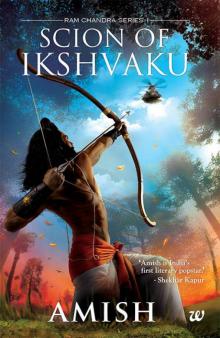 Scion of Ikshvaku
Scion of Ikshvaku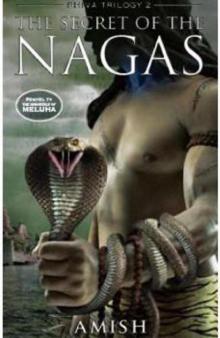 The Secret of the Nagas
The Secret of the Nagas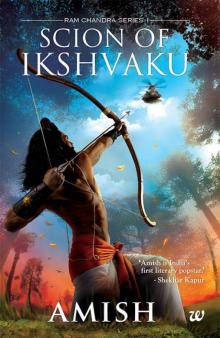 Scion of Ikshvaku (Ram Chandra Series) FlyLeaf.ORG
Scion of Ikshvaku (Ram Chandra Series) FlyLeaf.ORG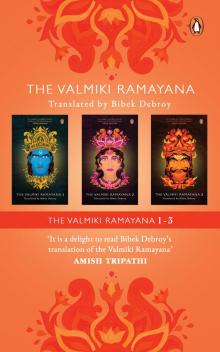 The Valmiki Ramayana
The Valmiki Ramayana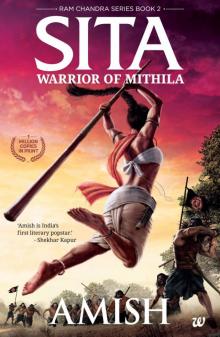 Sita: Warrior of Mithila
Sita: Warrior of Mithila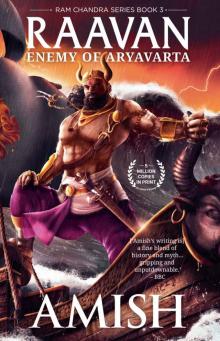 Raavan- Enemy of Aryavarta
Raavan- Enemy of Aryavarta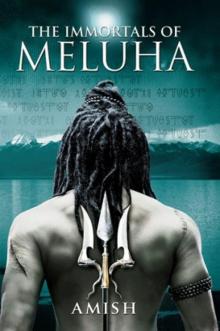 Immortals of Meluha
Immortals of Meluha